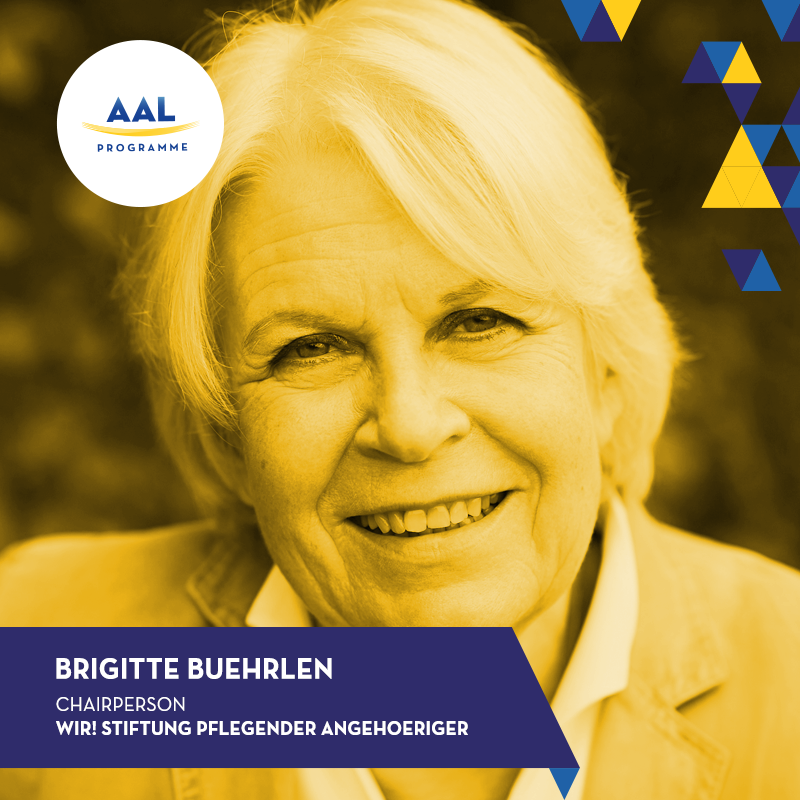Brigitte Bührlen – Keynote speaker
Bringing with her the perspective and knowledge of a first-hand career, Brigitte Bührlen, founder and chair of We! Foundation of Caring Relatives, is sure to provide an interesting perspective during her plenary one presentation at the AAL Forum 2017.
Brigitte looked after her mother, who suffered from dementia, for 20 years. After moving into her parent’s home, together with her husband and three children, the challenges became too much of a strain on all the family and they accepted professional care.
After the death of her mother, in 2010 Brigitte founded We! Foundation following years of directing self-help groups of caring relatives. The purpose of the foundation is twofold. Firstly, there is the side that promotes and encourages carers to come together and share experiences in order to build a support community. In doing so, groups will be able to formulate what their needs are in relation to care development, and they should have the confidence to lobby these in front of their politicians by proactively speaking at local and regional round tables.
On the other hand, We! Foundation hopes to enforce the importance of carers by pushing politicians to recognise that family members are the heart of care in Germany, whilst also using the support of science, the economy and society together, in order to grow networks that can support each other.
We spoke to Brigitte about her motivations and aspirations for We! Foundation.
“It is very important to me that family carers say themselves what they need, because in Germany we have organisations who speak for, and over, the people and so I wish to support carers and allow them to walk in their own shoes.
“The foundation has already had some great successes for example, I have helped support groups of carers in communities and cities all over Germany by inviting them to come together with scientists as part of “World Cafes” and write a book on, “How do we want to nurse and how do we want to be nursed.” The foundation also has quite a presence on Facebook and groups of carers of all ages wrote individual texts which were collected and combined into a self-organised and self-published book on the issues of how best to support carers and patients. This highlights there is some progress happening with the support of the foundation, and as a member of the Advisory Board for the compatibility of care and profession of the Federal Ministry of Family Affairs, Senior Citizens, Women and Youth in Germany, I am being heard. On the board, I am currently working on a paper for the government on how to manage the care situation when you are working full time and trying to care full time, also.”
When asked what it was that carers in Germany are wanting to change, Brigitte commented on the restrictions that are in place due to the structure of Germany’s care system.
“In Germany, family care is the main care method and it is even part of the country’s social network that family members have to take care of each other, without entitlement to financial compensation. Even though the person who needs support gets money through the statutory compulsory insurance, the money they receive is for the family member who needs care. A part of the money can be given as compensation to their family, son or daughter for example, but the carer has no claim. And so, we have no security as we cannot pay into our social system when we do not have the necessary income. Yet when we get older, this leaves us with no money.
“130 years after the introduction of general social insurance, society and families have changed a lot. It is now more common to have separated families or families that move away, and the prominence of professional women in work has changed and we need their work to support the economy. All these issues need to be talking about to enable carers to be supported financially and know that their loved ones are still being cared for properly.”
With regards to assisted technology as a part of We! Foundation, Brigitte was keen to emphasis her own personal interest in technology but also with regards to staying connected with family and friends in an ever-increasing fast-paced society, especially when it comes down to patient-carer relationships.
“Technology can bring patients, doctors, family, and even insurance companies together. It can bring security and provide answers quickly, and it enables you to do this yourself in your own home with your own independence. It could also bring medical benefits in the cases of monitoring for falls or heart attacks. All the while, family members can reassuringly go back to work.”
Speaking at the AAL Forum, Brigitte hopes to bring her expertise from the carer perspective and once again, give her voice in what carers need and want, to those directly trying to come up with the tech solutions. Although age-appropriate assistance is already being developed, Brigitte is aware that a high proportion of the products are not being accepted and so she hopes to help more stakeholders ensure their ideas and innovations are for the people, “You should ask us what we need.”
Brigitte’s presentation at the Forum will offer a valuable insight into the issue of bridging the gap between technology and active ageing. More and more age-appropriate assistance systems are being developed to manage the challenges of demographic change but how do you ensure these are appropriate for potential users, their families and professional services? This is one of AAL main objectives and a lot can be learnt through this type of analysis. Be sure to book your place at this year’s forum!

